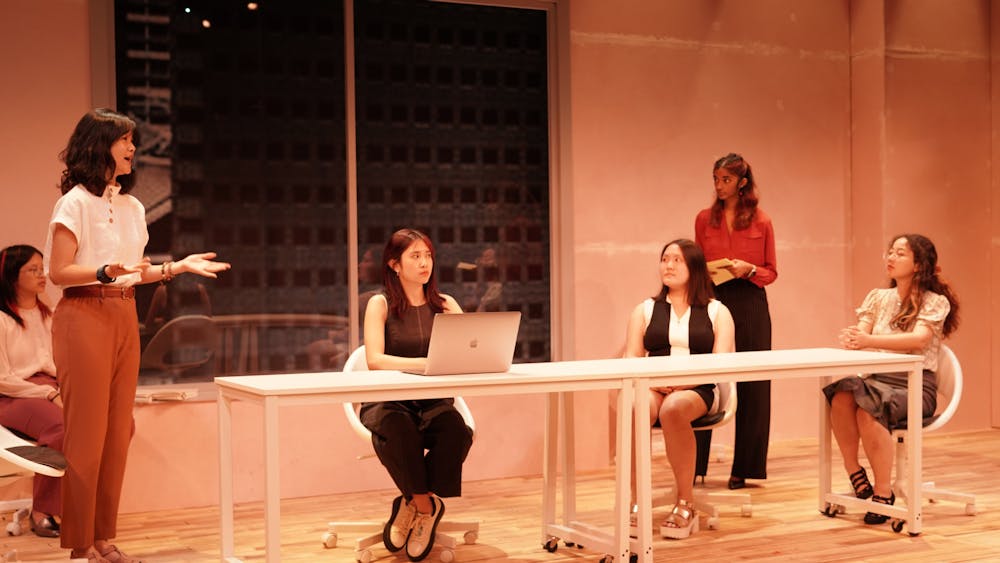Editor's note: Annabelle Zong and Helen Mei are members of The Collegian.
The University of Richmond's department of theater and dance showcased four performances of “White Pearl,” one of its first productions to feature a majority-Asian character cast.
The play, written by Anchuli Felicia King, followed six Asian women from different economic, ethnic and racial backgrounds who together form a cosmetics company called Clearday. The company accidentally released a racist ad, which used a colorist idea to market its whitening cream.
Sophomore Amy Ogle, who plays Built in the production, said the play highlighted those frequently misrepresented and underrepresented, instead of having one or two “token Asian characters.”
“We don't usually see this sort of representation, especially to this scale where almost the entire cast is female and Asian,” Ogle said.
King used humor and exciting characters to create an entertaining tale of how the cosmetic company fixed its error through blackmail, manipulation and playing the system. The play fosters discussions about colorism, which is defined as discrimination against people because of their skin tone.
The play consisted of seven characters, six Asian women and one white man. The UR students cast as the main characters came from diverse backgrounds, including different levels of theatrical experience.
The show was labeled as a comedy with some very dark humor, according to several cast members.
“It's like, you're not laughing out of, ‘oh my god, I am happy,’” senior Lauren Xavier, who plays Priya in the show, said. “You're laughing like, ‘I don't know how else to react.’”
The students featured in the show gushed about the storytelling and the effect working on the show had on them. It fostered discussions about race among the cast members and brought them closer through shared experiences of systemic racism.
First-year June Pham, who plays Sunny in the production, explained the dynamics of the show: each character is from a different Asian country, adding to the tension between characters. Two characters specifically talked about their friendship transcending the bounds of being Japanese and Chinese.
“You think because I am Japanese and you are Chinese and because we are not supposed to like each other – you think because of this, I don’t like you?” Ruki, a character in the show, said.
Enjoy what you're reading?
Signup for our newsletter
Outside of this conflict, the actresses discussed the racism directed towards them. Xavier spoke on the challenges she has faced as a student of color at UR, saying it was really scary for her to be almost always the darkest person in a room when she first arrived at UR.
"The first week I came on campus, I was not aware of how white this campus was, and I cried," Xavier said. "With the whitening creams, I've never wanted to [use them] but I have been in situations where I'm like, 'it would just be so much easier if I was not as dark as I am.'"
Her character, Priya, was the CEO of Clearday. Priya supported the idea that the company should’ve marketed its whitening cream as making women’s skin more “clean” and bright, idealizing whiteness under an ulterior label, she said.
“I have a Western education and I have a British accent,” Xavier said of her character. “And I'm very fancy, and I'm kind of super racist.”
Xavier said that whitening creams are inherently colorist because the reason they exist in the first place is because people don’t want to be Black.
The cosmetics companies in both the fictional and real-world abuse women’s insecurities for their profit by reinforcing those insecurities through racist ads, Ogle said.
Another theme within the play was its commentary on business culture, Dorothy Holland, the director of the play, said.
“The play is corporate realism, which is a grotesquerie of how the profit and corporate culture globally affects our behaviors with each other – when everything becomes about market share and money,” Holland said.
Intertwining themes of racism, colorism, shame, guilt and culture, the play demands audiences to thoughtfully examine their own biases and thought patterns.
“We put that into a dark comedy to raise awareness about racism as well as the beauty standards between Asians and other countries in the world,” Pham said.
Contact lifestyle writer Rosalie Hinke at rosalie.hinke@richmond.edu.
Support independent student media
You can make a tax-deductible donation by clicking the button below, which takes you to our secure PayPal account. The page is set up to receive contributions in whatever amount you designate. We look forward to using the money we raise to further our mission of providing honest and accurate information to students, faculty, staff, alumni and others in the general public.
Donate Now



